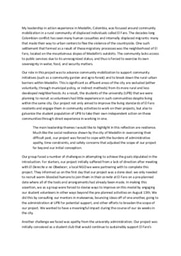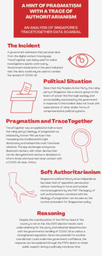makesense re-action for impact project report
My Leadership-in-Action project for this year was conducted through makesense, an organisation based in Mexico that empowers social entrepreneurs to create meaningful change in communities. If that sounded somewhat vague, hopefully this report will serve as an example to clarify their mission statement. The project took place within the city of Medellin in Colombia, renowned for its natural beauty and social resilience in overcoming its troubled past.
My specific project within the Colombia LiA focused on empowering community action in a rural, underserved community located in the edges of Medellin. El Faro, as the neighbourhood is known, is a unrecognised community located in Comuna 8 mainly made up of internally displaced individuals fleeing conflict in the countryside. Given the informal nature of the settlement, the municipal government does not provide access to potable drinking water or other public services given to other barrios. As a result, the inhabitants of El Faro live in a precarious situation where improvised methods to collect water, manage electricity, and monitor criminal activity are all in place through the efforts of the local community action group. We established contact with the community action group in the hopes that we could contribute our time and energy to benefit the residents of El Faro.
Gabriel, the president of the action group, presented to us the main issues facing the community that we could participate in alleviating. El Faro is host to several community projects: a community garden and agroforest being two of the main ones. While the initial groundwork for these two projects had been completed, a lack of manpower and funds has largely halted any progress on these measures to raise community participation. Our group was then entrusted to help Gabriel through organising a convite to continue work on these projects through recruiting student volunteers from the university we were working from: the Pontifical Bolivarian University (UPB). In conjunction with a local organisation named El Derecho a no Obedecer, we would begin organising the logistics of transporting dozens of students and volunteers up the mountains of Medellin, preparing for the large group lunch at El Faro, and purchasing the necessary tools and equipment to advance these two projects forward.
But when Gabriel initially presented us with our tasks, we wanted to take it a step further. Through our background research that was also supported by Gabriel's experiences, we noticed that a rural-urban divide was prominent within the city of Medellin itself. The difference between the affluent neighbourhood of Laureles where the university was and the mountainous rural situation in El Faro was staggering. Curiously enough, the students at UPB (a private university in it's own right), were also largely made unaware of this salient divide through their own social position as upper-middle class students. Thus, we made it one of our project goals to tackle this rural-urban divide and provide the UPB student volunteers who would be working with us additional insight into the "two Medellins" that existed right under their noses.
The action portion of our project went through many iterations. Initially, we wanted to establish a lasting student organisation or club that would continue advocating for El Faro and its residents (as well as supporting their community projects) at the university. It was much to our surprise when we discovered that extracurricular activities had no institutional base of support like at our home universities. The concept of a "student club" was quite foreign to the administration at UPB, and while student organisations existed they were mainly reserved to hobby clubs or academic working groups with professors. Thus, we were unable to secure administrative support for our student group concept, and adjusted our goals to match the situation.
Our next step was to pursue support from academics in UPB: professors who had conducted research on El Faro's water sovereignty and political science professors that explained the political context of the conflict and its relationship to El Faro. In doing so, we were able to secure some support for our student volunteers: our contacts in UPB's faculty would open themselves up to accepting any interested volunteers who wanted to continue research into El Faro or other political ecology topics beyond the scope of our LiA project.
To continue, we decided to divide our recruited student volunteers into two groups: logistics and research, to expand the scope of our project beyond a single day of manual labour in El Faro. The logistic team would focus on the aspects of organising the journey, supplies, and manpower to the planned convite on August 13th, 2023. Meanwhile, our research team would be hard at work writing briefs on El Faro's historical context in relation to the Colombian conflict, the history of El Faro and its issues, and what actions could be taken to advance their rights and improve their standard of living. The ultimate goal of this would be to produce a short documentary film that highlights all of the above points, using interviews and footage from our time in El Faro during the convite.
Up to this point, our project had undergone significant changes during the preparation period. We encountered reluctant deans, professors that hit us with reality checks, apathetic partner organisations, and the elements as well. But through all of the roadblocks and twists along the way, we were able to muster over 50 people to go to El Faro on August 13th, plant precious saplings in the agroforest and community garden to strengthen El Faro's food sovereignty, and engage the community in meaningful dialogue about their struggles and directly contribute to their standard of living. In doing so, we discovered how passionate our volunteers were about their commitment to societal well-being—despite never having been to El Faro they worked through blistering heat on a forested mountainside and gave up their valuable free time to contribute to our project. Our volunteers were truly the saving grace of our entire six weeks in Colombia.
While our group may no longer return to Medellin, I reserve my complete faith in our student volunteers to continue advocating for the cause of El Faro and working to improve the lives of those that have been displaced by violent conflict in their country.
Thank to the Laidlaw Foundation for giving me the opportunity to make a difference, makesense (Daniella and Evelyn) for being the most wonderful guides and mentors throughout the trip, El Derecho for providing us the means to mobilise our volunteers, UPB for hosting us so graciously, my project teammates Hannah and Lia for carrying me through this experience, and our volunteers for their dogged commitment to the cause.


Please sign in
If you are a registered user on Laidlaw Scholars Network, please sign in